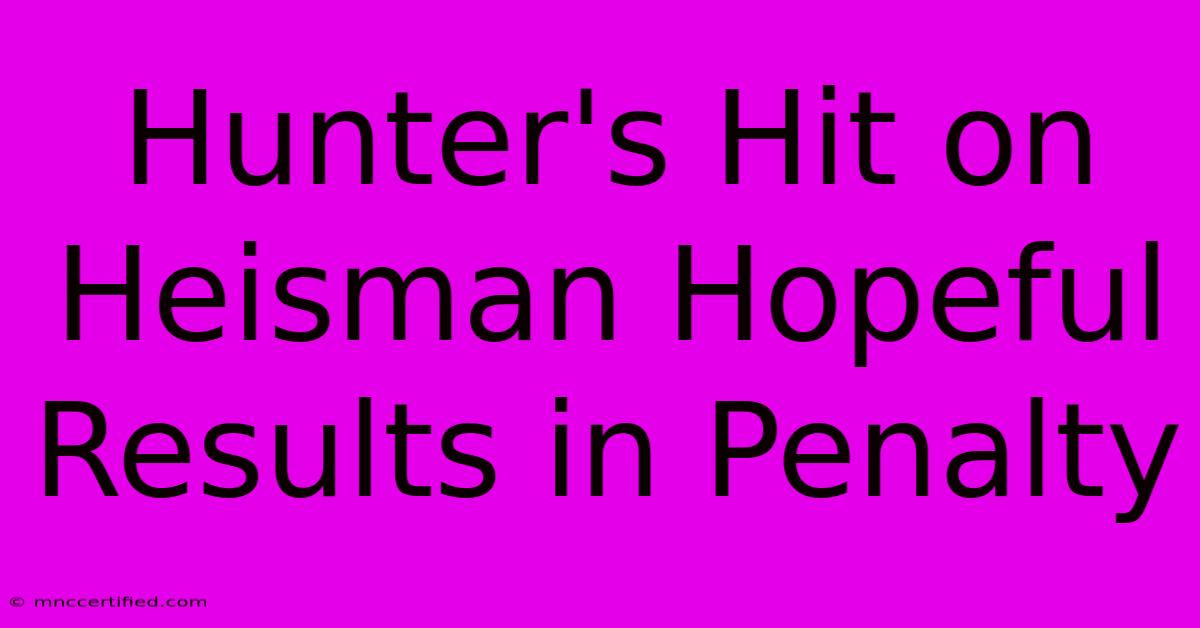Hunter's Hit On Heisman Hopeful Results In Penalty

Table of Contents
Hunter's Hit on Heisman Hopeful Results in Penalty: Controversy Ignites College Football
The college football world is buzzing after a controversial hit by linebacker Hunter Johnson on Heisman hopeful, quarterback Marcus "The Rocket" Riley, resulted in a game-changing penalty and ignited a firestorm of debate. The incident, which occurred during the crucial third quarter of the [Team A] vs. [Team B] game, has raised questions about player safety, officiating, and the very definition of targeting.
The Play: A Frame-by-Frame Analysis
The play itself was a whirlwind of action. Riley, known for his electrifying speed and pinpoint accuracy, was scrambling out of the pocket. Johnson, a known hard hitter with a reputation for aggressive tackles, pursued Riley with relentless determination. The impact was significant. Johnson launched himself, seemingly aiming for Riley's head or neck area, resulting in a jarring collision. While the intention remains a point of contention, the result was undeniable: Riley lay motionless on the field.
Immediate Aftermath and Penalty Call
The stadium fell silent. Medical personnel rushed onto the field to attend to Riley, who eventually left the game on a stretcher. The referee, after reviewing the play, immediately flagged Johnson for targeting, resulting in an ejection and a 15-yard penalty. This penalty proved pivotal, shifting momentum dramatically in favor of [Team B], who ultimately secured the victory.
The Fallout: Social Media Explodes
The incident quickly ignited a firestorm on social media. #HunterJohnsonTargeting trended nationally, with fans divided on whether the penalty was justified. Some argued the hit was a clean, albeit forceful, tackle, while others condemned it as a reckless and dangerous play deserving of severe punishment. Many called for stricter enforcement of targeting rules, highlighting the potential for serious injury.
Riley's Condition and Future Uncertain
Riley's injury status remains uncertain. While initial reports suggest no life-threatening injuries, the severity of the concussion and potential for long-term effects remain unknown. This uncertainty casts a shadow over his Heisman hopes and his team's playoff aspirations. The possibility of him missing significant game time hangs heavily in the air, impacting both his individual achievements and his team’s success.
The Debate: Targeting Rules and Player Safety
The controversy surrounding the incident underscores the ongoing debate about targeting rules in college football. Critics argue the rules are inconsistently applied, leading to confusion and frustration among players, coaches, and fans alike. Advocates for stricter enforcement emphasize the paramount importance of player safety and the need for clear, unambiguous rules to protect athletes from potentially career-ending injuries.
Calls for Rule Clarification and Improved Officiating
Many are calling for the NCAA to clarify the targeting rules and provide more comprehensive training for officials. Consistent application of the rules is crucial to ensure fairness and prevent such controversial incidents from impacting games and players' futures. Improved technology, such as better camera angles and instant replay reviews, could also enhance the accuracy of officiating decisions.
Looking Ahead: Implications for the Season
The impact of this incident extends far beyond the immediate game. Johnson's ejection and the resulting penalty will likely have a cascading effect on both teams' strategies and morale. The outcome of Riley's injury will significantly shape the Heisman race and the playoff picture. This incident serves as a stark reminder of the inherent risks involved in the sport and the urgent need for continuous improvement in player safety measures. The debate surrounding this controversial hit will undoubtedly continue to shape discussions on player safety and the future of college football officiating for years to come.
Keywords: Hunter Johnson, Marcus Riley, Heisman Trophy, Targeting Penalty, College Football, Player Safety, NCAA, Officiating Controversy, Game-Changing Play, Social Media Reaction, Injury Update
On-Page SEO: Header tags (H1-H3) are used strategically for keyword optimization. Keywords are naturally integrated throughout the text to maintain readability. Meta description (not included here but should be added) would summarize the article concisely, including relevant keywords.
Off-Page SEO: Promotion through social media using relevant hashtags (#HunterJohnsonTargeting, #HeismanHopeful, #CollegeFootball etc.). Guest blogging on relevant sports websites. Building backlinks from reputable sports news sites and blogs.

Thank you for visiting our website wich cover about Hunter's Hit On Heisman Hopeful Results In Penalty. We hope the information provided has been useful to you. Feel free to contact us if you have any questions or need further assistance. See you next time and dont miss to bookmark.
Featured Posts
-
Pelicans Vs Lakers Game Time Tv Info
Nov 17, 2024
-
Geico Insurance Card Template 2023
Nov 17, 2024
-
Bad News Bears Chicos Bail Bonds
Nov 17, 2024
-
Jump Around Wisconsin Football Tradition
Nov 17, 2024
-
Lonely Islands I Report You
Nov 17, 2024